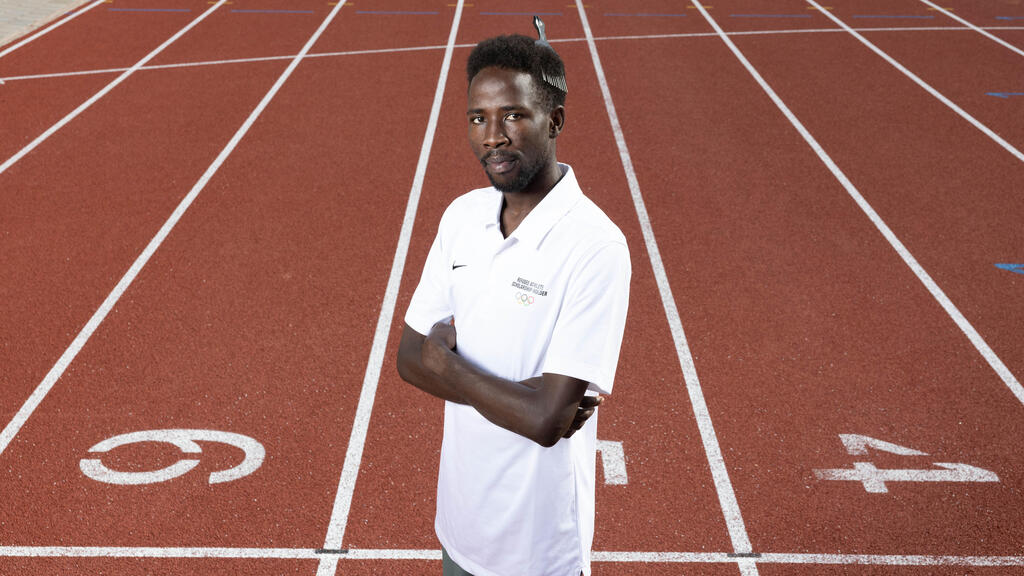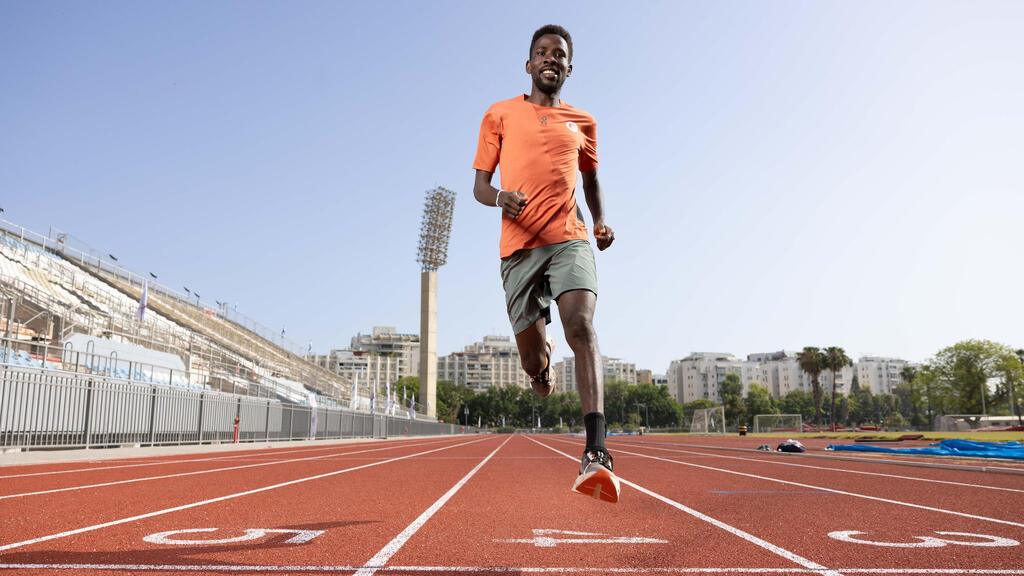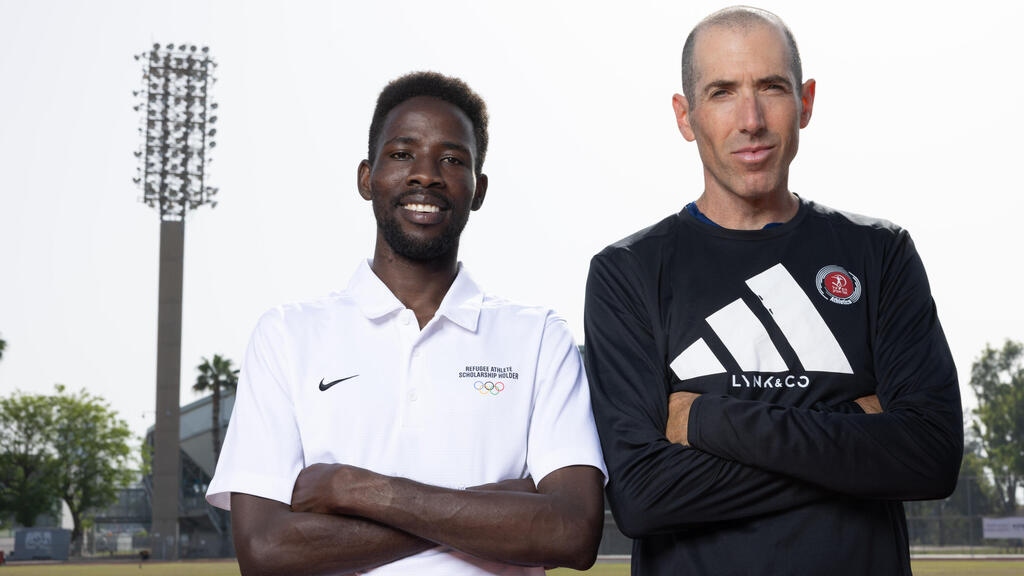Getting your Trinity Audio player ready...
When he was only 10 years old, Jamal Abdoul-Magid was a shoe shiner on the streets of Khartoum, the capital of Sudan. "It was to help the family that was in need," he explains, "but also to try to raise money for the future."
At the age of 15, he took his first bold step: Jamal obtained forged documents identifying him as an adult and used his savings to board a plane to Cairo, embarking on a new life of freedom.
This summer, Jamal will compete in the Olympic Games for the second time in a row, not as a representative of Sudan or Egypt and not even Israel, which has been his home in recent years. He will compete again as part of the Refugee Olympic Team, and although this is an amazing milestone in the career of the long-distance runner, it is more evidence of his precarious status.
He will compete with another refugee who lives and trains in Israel, Eritrean runner Tachlowini Melake from Emek Hefer who also competed in the Tokyo Olympics, where he came in a surprising 16th place in the marathon.
"The civil war in Sudan has been going on since my childhood," reflects Jamal. "Even before the flight, I came home one day and saw everyone crying. They told me that my father had been murdered, one of thousands that the authorities killed. There were many days of crying at home about what had happened and what was to happen. It was clear that it was better to leave Sudan."
"That's how I arrived in Cairo; I saw the demonstrations in Tahrir Square against President [Hosni] Mubarak and realized that I had to continue quickly, otherwise I wouldn't survive. I crossed the desert by car and on foot, many elderly people were traveling with me. On the way, we were also detained in a prison in Sinai. In the end, I managed to reach the central bus station in Tel Aviv," he says.
The proud family left behind is still unsafe, according to Jamal. "Two months ago, someone shot my brother in the shoulder and sent him to the hospital. We don't even know who and why they were looking to hurt him. Understand where the family is that I care about so much."
Jamal, who received a visa to stay in Israel for humanitarian reasons after being sent to detention here as well, acclimated to the country, and then completely by chance turned out to be a promising athlete while playing soccer with friends. He received a recommendation to apply to the South Tel Aviv Alley Club and began training ten years ago with coach Yuval Carmi, who recognized a natural talent in him. Since then, the man who worked as a cleaner on one of Herzliya's beaches became a promising athlete.
His name came into the hands of the International Olympic Committee, which in the last decade began to take care of stateless athletes around the world and group them into one refugee team.
Jamal's extraordinary diligence gave him a future he never imagined. He competed at the 2019 World Championships and was selected to run 5,000 meters in Tokyo in summer 2021. He did not make it to the Olympics then, placing 23rd with a personal best of 13:42.88 minutes, and missing the prestigious final run by just a second and a half while leaving behind decorated rivals.
In Paris, he plans to make it to the final, despite suffering an injury at the European Athletics Championships in October, where he finished ninth. He got out of the rhythm of training and lost three months, but the Olympic Committee once again included him on the team, and his coach Yuval Carmi believes that this time, too, Jamal will run strong.
It's hard to get him after 9 p.m. That's his bedtime in order to arrive fresh for morning training, the first of two during the day. Until recently, he worked as a housekeeper in a building on HaYarkon Street in Tel Aviv but was fired last week and now devotes himself entirely to sports.
"The neighbors claimed that I am often in training camps abroad and not in the building. What will happen? We will get along. Right now I am busy with the Olympics," he said.
In the meantime, he is using a scholarship from the International Olympic Committee to help financially the family he left behind, and tries not to worry too much about his livelihood; he is already used to the fact that his life is not a pleasure trip.
Attempts to receive citizenship
Despite the extensive support they receive from outside, in the end, Jamal and Tachlowini live on what they receive in Israel. They receive a medical package like all members of the Israeli national team, went through an English course arranged for them by the Olympic Committee and Jamal even learned massaging under the guidance of former boxer Dr. Aharon Jacobi on a voluntary basis ("I do it more for fun," admits the athlete).
Meanwhile, the Israeli Olympic Committee's website leaves no room for doubt. The two men may be competing as part of the refugee team, but the news of their selection for the second time at the Olympic Games opened with six words that say it all: "They are one of our own!"
But when it comes to citizenship and representation of Israel, things are not moving. It's a problem that refugee athletes face all over the world. For example, one of Jamal's close friends is Dominic Lobalu, who fled Sudan to Switzerland. The two train together abroad, and Lobalu even invited Jamal to live with him in St. Moritz. But Lobalu is also not recognized as a citizen in his country, and for many months has been leading a publicized struggle to regularize his status, which is receiving positive reactions.
"I feel that I represent Israel," says Jamal. "Despite belonging to the refugee team, I felt part of the Israeli team at the competitions. The attitude of the team toward me is great. We didn't feel any distance."
The Israeli Olympic Committee announced even before the Tokyo Olympics that Jamal and Tachlowin deserve citizenship. Knesset Member Chili Tropper, during his time as culture and sports minister, recommended this, but then-interior minister Ayelet Shaked did not approve the request. There is another push to complete the move through the current Culture and Sports Minister Miki Zohar, and the athletes are awaiting developments on the matter.
His goal is to reach the finals
Jamal has another great advantage that is helping his advancement: He is a protégé of Rotem Genossar, manager of Hapoel Tel Aviv and one of the heads of the refugee department of the International Athletics Federation, who will also man the position in Paris.
"Obviously, I will be very close to Jamal in his training," says Genossar, who has already managed the refugee team in three world championships.
The last three years have matured Jamal as an athlete. In Tokyo, no one paid attention to him and now he is a legitimate Olympic runner. "When I saw in front of me on the same track the world record holder Joshua Cheptegei, whom I only knew from TV, I was really shaking. I was scared, it was an indescribable excitement. But I didn't lose my cool. Not only did I drop under 14 minutes in that run for the first time, I cut 20 seconds off my record. I was the runner with the weakest entry result. I, from a neighborhood in Tel Aviv, face the greatest runners in the world."
And how is he expected to perform in Paris? Carmi says "Jamal has progressed a lot since Tokyo. What he did in the European Athletic Championships was the achievement of his life, greater even than the Olympics. There is no doubt that the heavy heat conditions in Tokyo acted in his favor, and the weather will have an effect in Paris as well."
Jamal adds: "My goal is to reach the final. I believe in myself even though most participants have better records than mine. I do not forget that, together with the refugee team, I also represent Israel. This is my dream. It is thanks to sports officials in Israel, thanks to their warm attitude, that we will represent them, even if indirectly."
"Every person has a destiny," Jamal continues. "I took my situation hard, and then I changed my perspective and looked at it positively. How many people even have the honor of participating in the biggest sporting event in the world? If I participate, it means that almost every person has hope."
Jamal takes with him to the track his role models, those wonderful African runners who started from the lowest point as refugees and became legends in their new countries, led by Mo Farah, who fled from Somalia to Britain. Even if he doesn't reach those heights, he's already at a point that the boy who polished shoes didn't even know existed.




